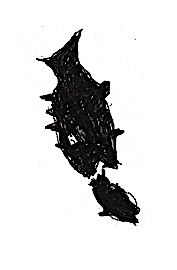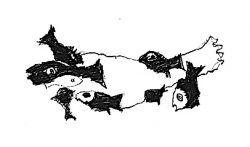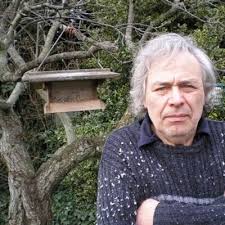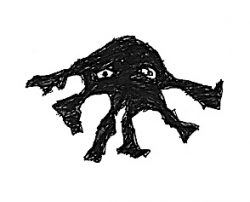#504 Joe Rosenblatt obituary
March 12th, 2019

“Joe was one of the most generous and kind artists [of any genre] I ever met, a truly lovely person, and a real genius.” — Phyllis Reeve
“Poetry provides an environment for people to share their feral fantasies, although very rarely do wild phantasms morph into poems.” — Joe Rosenblatt
Born in Toronto in 1933, Joe Rosenblatt has died on Monday, March 11 at 2 pm.
“Joe lived on his own while he wrote his book Bite Me,” says visual artist Marci Katz, who was a friend for thirty years, “but after a series of falls due to mobility problems, and a few hospital visits, he became quite frail and moved into care, most recently in the Qualicum Manor in Qualicum Beach, where he continued to decline (though his mind was as strong and lucid as ever!). It was a peaceful end. He didn’t live to see a copy of Bite Me but he was very gratified to learn of the wonderful review by Tom Sandborn in the Vancouver Sun.” The review was read aloud to him by novelist Dennis Bolen.
Joe Rosenblatt worked as an editor of Jewish Dialog and later wrote a memoir about his childhood called Escape from the Glue Factory. He will likely go down in literary history for writing the second book ever published by Coach House Press, The LSD Leacock, in 1966.
In 1976, Ronseblatt’s Top Soil won the Governor General’s Award for Poetry. He won the Dorothy Livesay Poetry Prize for Poetry Hotel in 1986. His work appeared in more than 50 anthologies and literary magazines. He came to live in Vancouver in 1980, then moved to Vancouver Island and served as Writer-in-Residence and visiting lecturer at the University of Victoria. He traveled extensively for readings in Italy and several of his books were translated into Italian.
Many of the personal essays in The Lunatic Muse reflect upon the influences of his writerly colleagues such as Gwendolyn MacEwan, Milton Acorn and Brian Brett, as well as his philosophy of poetry and writing: “Poetry is a way of going out on a blind date to meet your soul, and you’ve promised to meet your true essence at a trendy nightclub in some dark alley of the inner city. You arrive there, sit down at an empty table, without realizing your date is sitting right next to you. It sees that you are invisible to each other. And finally this cadaverously lean waiter appears out of the shadows and says: You want to order something from the bar? Sure, you reply, what’s on tap. The waiter reads out the brand names of some local brews: ‘we have Eternal Life, a fuzzy dark cumulous of an ale, we have Deep Space, a sparkly bitter beer, somewhat heavy, like a burnt-out lodestone – an acquired taste….’ Suddenly you see your waiter fading away, and then it occurs to you that your date is never going to show up , and further, that you are in the wrong bar, the wrong cul de sac and even worse, you are talking to a complete stranger, your navel. That’s poetry!”
Inspired in part by his love of the tall trees—ancient Douglas firs –and roving in the Qualicum Beach Heritage Forest, Joe Rosenblatt’s Bird in the Stillness (Porcupine’s Quill $16.95) is a collection of fifty forest devotionals dedicated to the mythic Green Man, a spirit of the woods of his own making. Rosenblatt tells a story through these sonnets, but it’s a narrative that is slowly revealed in lines and fragments. Each offering to the Green Man can be digested individually, with no expectations toward a larger tale. Each piece reveals minute glimpses into Rosenblatt’s interior. Behind these sumptuous praises is a man in the twilight of his writing career, overwhelmed by the timeless gaze of the trees. The poet is cast, by juxtaposition, in a fleeting, ephemeral light. Each poem reveals a little more about his myriad inadequacies when in the Green Man’s mighty shadow.
At times Rosenblatt’s muse is cast in equally human tones, but the dominant narrative is the majesty of the Green Man beyond anything humans can achieve. This collection of poems serves as a reminder of the gossamer frailty and solemn power of the Qualicum Beach forests.
Describing the Green Man, he concludes one of his sonnets:
His spirit is indomitable – and he won’t let it go astray.
I want to be a greener man than he who rules the forest.
How can I wrest the power from that unsmiling potentate?
A voice in my belfry desires that I be interred inside a tree.
I will not abide the creepy moss moving in and choking me.
The driving rain turns the soul to rot and that is terrifying.
In a review for Tidechange, Sharon Abron Drache notes that he has been both writing and drawing in response to the environment since he gained notoriety for a series of sound poems in the 1960s, Bumblebee Dithyramb, praising bees at Toronto’s Allan Gardens as Mother Nature’s proletariats. She ably recalls the evolution of Rosenblatt’s “nature-starved urban imagination.”
Drache notes that Rosenblatt, as a teenager, had fled to Allan Gardens to escape the death scene he witnessed daily while working in his Uncle Nathan’s Kensington Market fish store. “For the young and sensitive poet, the fishmonger he previously respected had morphed into both a jailer and murderer as he confined fresh water carp in huge tanks before clubbing them to death for the gefilte fish made for the Sabbath and other Jewish holidays by his female customers – unlikely accomplices to his routine ichtycides.”
The Bird in the Stillness can therefore be likened to a spiritual feast. Nature is in abundance. Starvation, begone. “Rosenblatt’s muse,” writes Drache, “often a complex conglomeration of animated caricatures of naked women flitting in and out of his poems and drawings in their role as the perpetual guardian/nurturers of the natural world, are remarkably absent in his new book of sonnets, The Bird in the Stillness.”
Rosenblatt’s new book about ‘the bizarre side of Mother Nature’s handiwork,’ Bite Me: Musing on Monsters and Mayhem (Porcupine’s Quill), was reviewed by Tom Sandborn on March 8, 2019 for The Vancouver Sun. Sandborn wrote: “Rosenblatt celebrates his own oblique and surreal connection to reality on every page of this marvelous book. He can wax tender in a poem about the death of his wife and within a few pages muse about the appeals of self-cannibalism and his curiosity about how his own flesh might taste. What remains constant throughout the tonal shifts and sometimes-nightmarish imagery is the poet’s restless and penetrating mind, chewing away on a refractory world and turning it into beauty.”
For many years Joe Rosenblatt lived at Qualicum Beach. He is fondly remembered as a mentor and friend by many, including B.C. publishers Richard Olafson and Peter Milroy.
“To my mind, Joe was equally talented as a visual artist,” says Peter Milroy. “His mad Trotskyist visions of the animal kingdom often found their way into his intimate and detailed drawings and more recently in increasingly abstract paintings generously textured with paint. He was a fixture in my family for many years and we will all miss him.”
Olafson who met Rosenblatt at New College in Toronto in the mid-1970s where Rosenblatt was teaching, and when Rosenblatt wrote a series of punk poems, Loosely Tied Hands.
BOOKS:
The LSD Leacock. Coach House Press, Toronto, 1966
Winter of the Luna Moth. House of Anansi, Toronto, 1968
Bumblebee Dithyramb., Press Porcepic, Erin l970
Tommy Fry & the Ant Colony ( fiction). Black Moss press, Windsor, l970
Blind Photographer. Press Porcepic, Erin, 1974
Dream Craters. Press Porcepic, Erin, 1975
Virgins & Vampires. McClelland & Stewart, Toronto, 1975
Top Soil, Selected Poems (l962-1975). Press Porcepic, Erin, 1976
Loosely Tied Hands. Black Moss Press, Windsor, 1978
The Sleeping Lady. Exile Editions, Toronto, l980
Brides of the Stream. Oolichan Books, Lantzville, B.C., 1983
Poetry Hotel, Selected Poems (1963-1985). McClelland & Stewart, Toronto, 1985
Escape From the Glue Factory. (autobiographical fiction) Exile Editions, Toronto, 1985
The Kissing Goldfish of Siam. (autobiographical fiction) Exile Editions, Toronto, 1989
Beds & Consenting Dreamers. (an experimental novel) Oolichan Books, Lantzville, B.C. 1994
A Tentacled Mother (in the original plus new sonnets) Exile Editons, Toronto, Oct. 1995
The Rosenblatt Reader (selected poems and prose, 1962-1995) Exile Editions, Toronto, Oct. 1995.
The Voluptuous Gardener (new poetry and slected drawings from Carleton University Art Gallery permanent collection) Beach Holme Press, Van couver, Oct. 1996.
The Lunatic Muse [ed. David Barry] (Exile Editions, 2007) $22.95 978-1-855096-098-3
Dog (Mansfield Press, 2008). Poems by Joe Rosenblatt and Catherine Owen. Photos by Karen Moe.
The Bird in the Stillness (Porcupine’s Quill 2016) $16.95 978-0-889843-94-3
Bite Me: Musing on Monsters and Mayhem (Porcupine’s Quill 2019) $16.95
*
Bite Me! Musings on Monsters and Mayhem
by Joe Rosenblatt
Erin, Ontario: Porcupine’s Quill, 2019
$16.95 / 9780889844247
Reviewed by Phyllis Reeve
*
 The day after Joe Rosenblatt died, his last book arrived in pre-publication digital format. I don’t want to write an elegy; others are doing that. It turns out I don’t need to; the poetry itself provides more than enough insight into mortality.
The day after Joe Rosenblatt died, his last book arrived in pre-publication digital format. I don’t want to write an elegy; others are doing that. It turns out I don’t need to; the poetry itself provides more than enough insight into mortality.
Rosenblatt’s writing inhabits a parallel universe that sometimes overlaps with ours enough for a poor benighted reader to catch a glimpse of something weird and wonderful and grotesque and enchanting, definitely rich and strange. His previous book The Bird in the Stillness (2016) took us into the woods near his Vancouver Island home to meet the Green Man, a lyrical merging of author with tree.
His “novel” Snake City (2015) featured a hero, Freddie, whose best friend, a snake named Cottonmouth, hid among the ties hanging from a chrome hanger in a closet and whose companions include an alligator named Handsome Harry, a “snorty” hog, several repulsive nymphomaniacs, and a young man with three eyes, all in conversation with the angel Gabriel.
His final book plunges into offshore depths, sweats its path through tropical rainforests, and soars “above those lingering puffs of smoky acrid clouds,” to bring together the elements — wet, dry, hot and windy — of his whole lyrical “monsterology,” both a culmination and a continuation of all that went before.
Take the title: Bite Me! — a slangy response to a perceived insult and a signal of the poet’s central conceit. Sonnets alternate with prose snippets, and the introductory prose piece, “My Hungry Muse” warns: “I am letting the famished imagination out on a field trip.” His muse is not simply “hungry;” it is “ravenous,” akin to super-snakes and carnivorous plants; it scavenges in the sea around it and in the more exotic scientific reaches of the internet:
What especially fascinates me and excites my ravenous muse is the marine life existing at the bottom of the deepest oceans, bioluminescent critters that appear like ghostly mermaids to mariners gazing through the window of their bathysphere.
Rosenblatt loves old-fashioned slang words like “critter” and “noggin,” especially when he can associate them with “bioluminescent” or “herpetology.” In the first poem, which provides the title, a conger eel (“not a pretty sight”) eats someone’s legs; grizzly comedy accelerating to horrified realisation: “I kept on descending into a malaise of despair/ while each of my arms pleaded ‘Bite me!’/ to an approaching monster who wore my face.” We recognise the monster as carnivore but also as cannibal, and more than cannibal, self-cannibal. Natural history as autobiography.
 Disgusting? Well, yes, but no. The language is so rich, the pace so exhilarating, the images so startling, and the wit so wry that one cannot pause for disgust. This first of the book’s three sections, “Musings on Monsters and Mayhem” explores this bizarre gastronomical theme. In “A Drooling Plant” we are told, “There’s a lot of serious dining going on in heaven,” where “A myriad of stomachs are demanding to be filled” and “either you’re the eater, or the one who’ll be consumed.”
Disgusting? Well, yes, but no. The language is so rich, the pace so exhilarating, the images so startling, and the wit so wry that one cannot pause for disgust. This first of the book’s three sections, “Musings on Monsters and Mayhem” explores this bizarre gastronomical theme. In “A Drooling Plant” we are told, “There’s a lot of serious dining going on in heaven,” where “A myriad of stomachs are demanding to be filled” and “either you’re the eater, or the one who’ll be consumed.”
The imagination is “a bulbous flower that is always in need of nourishment” — “vital grub” which the sonneteer provides in the form of “metaphors, similes, ambiguities, rhyming, half rhyme, even an answer to one of life’s dilemmas, all in the concluding couplet of a sestet.” More than natural history, a sort of Rosenblatian theology evolves: “There are days I view God as some gargantuan plant/ hidden away in the setting of a dense tropical forest. /Or turned inside out, He could possibly be a stomach.”
But God moves away without leaving a forwarding address and never answers the poet’s emails. He might be an octopus or a supernal squid. “Minnows of epistemology nibble in my brain.” Rosenblatt tells us in a prose explication:
 Such is my fascination on how gifted nature is in extraordinary intelligence that I began to visualize that my brain in a potted plant requiring a daily conveyance of fresh invigorating ideas, for without that essential pollination, how could I have brought into being all of the above creations, benign and malevolent?
Such is my fascination on how gifted nature is in extraordinary intelligence that I began to visualize that my brain in a potted plant requiring a daily conveyance of fresh invigorating ideas, for without that essential pollination, how could I have brought into being all of the above creations, benign and malevolent?
How indeed? He has written elsewhere of his Lunatic Muse, but he had another Muse, a sane and beloved one, whose presence is felt throughout this volume. Rosenblatt’s wife Faye, who predeceased him by exactly two years, was a dedicated member of the Qualicum Beach Streamkeepers; a worshipper, he liked to tease, at the Church of the Holy Minnow. One of his more memorable oil paintings enlarges her tiny fingerlings into a “Moby Minnow.”
Faye died, and in the essay “Are Those Your Tears or Mine?” he mourns, “I’m filled with an insurmountable sadness that I can’t waft away.” He becomes obsessed with the drowning puppy in a Goya painting — “its ears turned back and its snout pointing up at a soiled ochre sky.” He learns that Goya never intended the painting for public exhibition: “It would appear that as a result of his deafness, the billowing vapour of melancholia was embodied in his doomed dog which was, in a sense, his alter ego.”
Goya’s dog resembles the tragic street dogs of Havana, honoured by Rosenblatt in the little book Dog (2009), which he co-authored with poet Catherine Owen and photographer Karen Moe, and which appeared in Italy as Caneide, translated by Ada Donati.
The Reaper is “harvesting his limitless supply of victims” and, the poet knows, “My dark cloud won’t vacate my noggin any time soon.” What other poet uses the word “noggin” in a treatise on death? But Joe Rosenblatt is not any other poet. A reviewer confronts the lack of other artists, visual or literary, to whom he may be compared. His universe has some affinity with those of Henri Rousseau or Hieronymous Bosch, but we have mentioned Goya; and in the context of Rosenblatt’s gourmand fantasia we cannot ignore that artist’s shocking painting of “Saturn devouring his son.” As for the words, who are his comrades? — Ezra Pound? Mallarme and the Symbolists? What about William Blake?
 The drawings. What of the drawings? Hastily viewed, they might be doodles. But these are Rosenblatt’s doodles, and there is a lot going on. There may be birds, cats, snakes, fish, spirits, angels, plants, all fighting and all making love. The winged apparition in the first drawing has dainty cherubic feet and a monstrous horned head from which a serpent erupts.
The drawings. What of the drawings? Hastily viewed, they might be doodles. But these are Rosenblatt’s doodles, and there is a lot going on. There may be birds, cats, snakes, fish, spirits, angels, plants, all fighting and all making love. The winged apparition in the first drawing has dainty cherubic feet and a monstrous horned head from which a serpent erupts.
But I must push on to “The Monster Boy Suite,” a set of “sonnets offered to be perused as a course of study of the sublime in the dialectics on monsterology.” We are forewarned: “I am not on any psychotropic medications, simply in sympathy with those who are marginalized in society.”
The Monster Boy is indeed marginalized, “the by-product of a carnal union between his mother and a giant octopus” and “the ultimate victim, bar none.” “Born without a mouth, he can only talk by way of an orifice in one of his feet.” He seems to belong in the pages of Renaissance wonder books or medieval bestiaries, but Rosenblatt pictures him coping in a high school cafeteria.
 The suite gradually shifts to a series of poems celebrating cats: Esmeralda, Blue, Zooey, and Faye’s favourite Camilla. We have met these glamorous creatures before, notably in Rosenblatt’s lush collection from 1996 The Voluptuous Gardener, where I first encountered the unforgettable line “The purring earth begins to move.”
The suite gradually shifts to a series of poems celebrating cats: Esmeralda, Blue, Zooey, and Faye’s favourite Camilla. We have met these glamorous creatures before, notably in Rosenblatt’s lush collection from 1996 The Voluptuous Gardener, where I first encountered the unforgettable line “The purring earth begins to move.”
“A pervading darkness placed its paw upon my chest” says the poet. But “The Muse Moves in a Biodegradable Way,” and the third section takes flight: Discovering the Monster in Me as Birdman.” As time “passes on tiny webbed feet,” this Birdman who is afraid of heights has not lost his sense of humour, imagining swooping down upon some unsuspecting golfers. He is nostalgic for teenage puppy love, for chewing gum “adhering to the armrest in some forties cinema, and a “stunning blonde chickadee” with whom he is hopelessly in love. Still, as in “His Flaming Nest,” he knows where he is going:
Don’t let the gloss on my feathers fool you.
Minute by minute my spirit is fading away
beneath my bristling downy soft coat …
Life is an agglutination of multiple stomachs
gastronomically gifted for gradual dining
until all that remains are bubbles of memory.
And this, too, dissolves in the soup of eternity.
I need to return to my alabaster chamber
to embrace the solitude in that oval room.
Am I residing in some ornate vaulted tomb?
Who is that newborn hatchling — it can’t be me!
I’ve yet to peck through the ceiling of that dome.
The quiet bird of time has a far-reaching beak.
He brings all the dead back to his flaming nest.
But first, “mercifully/ poetry’s gravitational pull hauls his body back to Earth” and he concludes in surprise: “I seem to have made a friend of the permeating silence./ It’s as though my entire skull has become a granite crypt.”
And that’s the end, except for a doleful inky critter with two wide eyes, six legs and an abdomen, alone in the middle of a page.
*
Phyllis Parham Reeve has written about local and personal history in her three solo books and in contributions to journals and multi-author publications. She also contributed the foreword to Charlotte Cameron’s play, October Ferries to Gabriola (Fictive Press, 2017). She is a contributing editor of the Dorchester Review and her writing appears occasionally in Amphora, the journal of the Alcuin Society. A retired librarian and bookseller and co-founder of the bookstore at Page’s Resort & Marina, she lives on Gabriola Island, where she continues to interfere in the cultural life of her community. More details than necessary may be found on her website: https://sites.google.com/site/phyllisreeve/
*
The Ormsby Review. More Books. More Reviews. More Often.
Editor/Designer/Writer: Richard Mackie
Publisher/Writer: Alan Twigg
The Ormsby Review is a journal service for serious coverage of B.C. books and authors, hosted by Simon Fraser University. The Advisory Board consists of Jean Barman, Robin Fisher, Cole Harris, Wade Davis, Hugh Johnston, Patricia Roy, David Stouck, and Graeme Wynn. Scholarly Patron: SFU Graduate Liberal Studies. Honorary Patron: Yosef Wosk. As of September, 2018, Provincial Government Patron: Creative BC
“Only connect.” – E.M. Forster







Leave a Reply